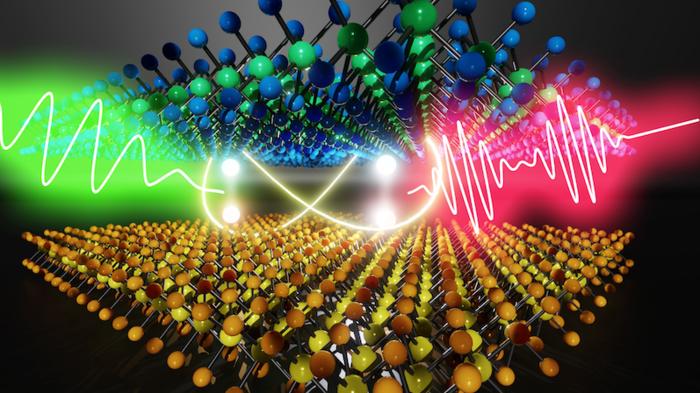Quantum technology is quantifiable in qubits, which are the most basic unit of data in quantum computers. The operation of qubits is affected by the quantum coherence time required to maintain a quantum wave state.

Credit: KyotoU/Matsuda Lab
Quantum technology is quantifiable in qubits, which are the most basic unit of data in quantum computers. The operation of qubits is affected by the quantum coherence time required to maintain a quantum wave state.
Scientists have hypothesized that moiré excitons — electron-hole pairs confined in moiré interference fringes which overlap with slightly offset patterns — may function as qubits in next-generation nano-semiconductors.
However, due to diffraction limits, it has not been possible to focus light enough in measurements, causing optical interference from many moiré excitons.
To solve this, Kyoto University researchers have developed a new method of reducing these moiré excitons to measure the quantum coherence time and realize quantum functionality. The team has observed changing photoluminescence signals of moiré excitons following the fabrication process.
“We combined electron beam microfabrication techniques with reactive ion etching. By utilizing Michelson interferometry on the emission signal from a single moiré exciton, we could directly measure its quantum coherence time,” Kazunari Matsuda of KyotoU’s Institute Advanced Energy explains.
The results show that the quantum coherence of a single moiré exciton remains steady at -269°C for more than 12 picoseconds, ten times longer than that of an exciton in the parent material, a two-dimensional semiconductor. The confined moiré excitons in interference fringes prevent loss of quantum coherence.
“We plan to establish a foothold for the next phase of experiments for advancing quantum computing and other quantum technologies in the next generation of nano-semiconductors,” adds Matsuda.
###
The paper “Quantum coherence and interference of a single moiré exciton in nano-fabricated twisted monolayer semiconductor heterobilayers” appeared on 8 June 2024 in Nature Communications, with doi: 10.1038/s41467-024-48623-4
About Kyoto University
Kyoto University is one of Japan and Asia’s premier research institutions, founded in 1897 and responsible for producing numerous Nobel laureates and winners of other prestigious international prizes. A broad curriculum across the arts and sciences at undergraduate and graduate levels complements several research centers, facilities, and offices around Japan and the world. For more information, please see:
Journal
Nature Communications
Method of Research
Experimental study
Subject of Research
Not applicable
Article Title
Quantum coherence and interference of a single moiré exciton in nano-fabricated twisted monolayer semiconductor heterobilayers
Article Publication Date
8-Jun-2024



